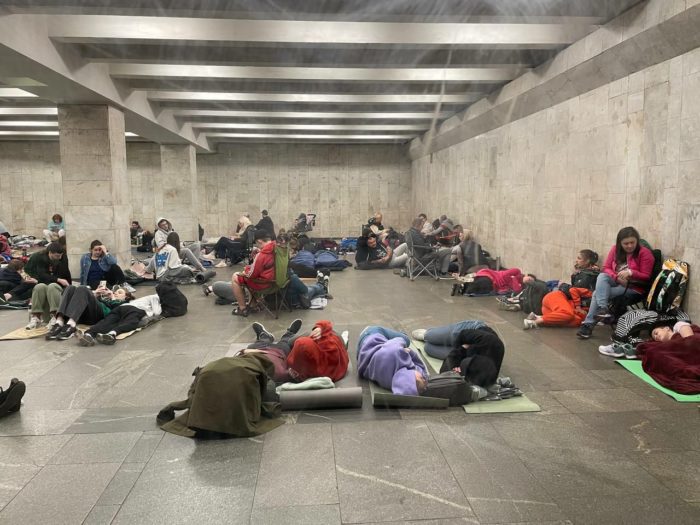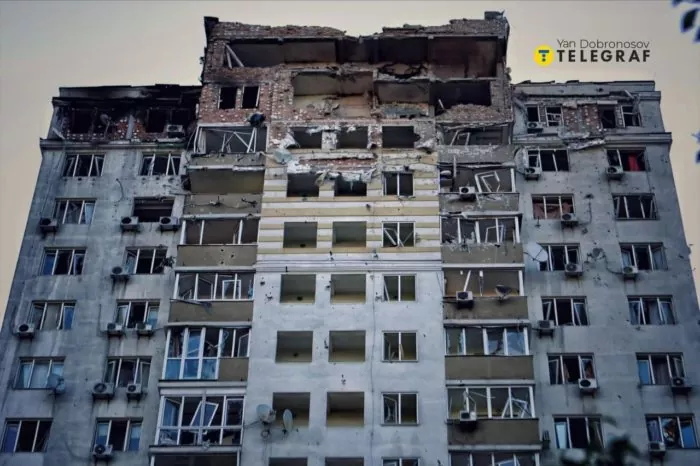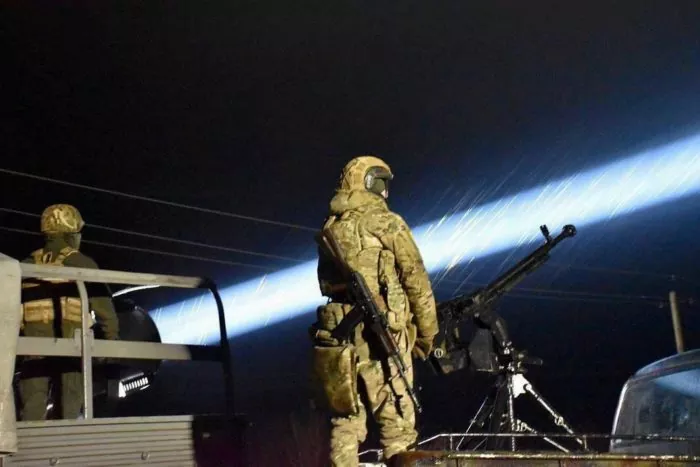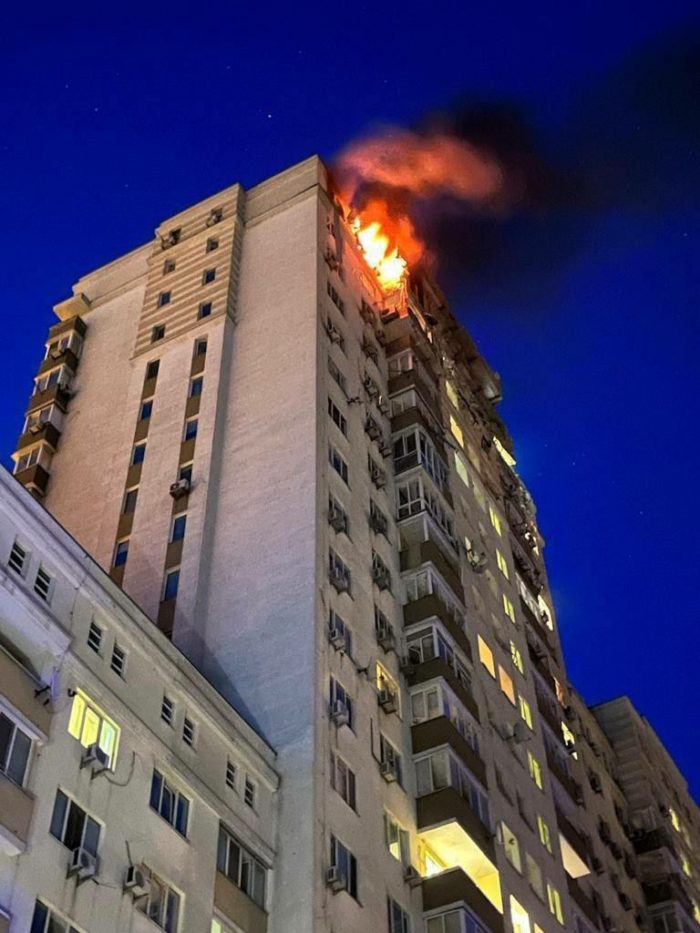Sleep deprivation, terror, destruction, and death of innocent people loom over Ukraine every single day. My dad jokes that Russian missiles rush toward our city when night falls, like vampires in horror movies. Laughing in the face of danger is what Ukrainians do all the time. A good sense of humor helps us stay sane under constant stress. We make fun of our situation, but deep inside crumble like a porcelain vase with every explosion that goes off overhead.
Last year when Russian troops approached Kyiv and tried to encircle the city, powerful blasts started to come crushing from multiple directions every hour, day after day, for weeks on end. We learned to tell artillery shelling in the distance from the sound of explosions caused by tanks, multiple rocket launchers, or airstrikes. We would take cover if explosions were close enough, trying hard to handle panic attacks and fear. Listening carefully to the sounds of war became a daily routine that could save our lives.
Battle of Kyiv: tactics and tricks that saved Ukrainian capital
Over time, the feeling of fear becomes duller. It tastes different nowadays, more than a year past. Fear is not paralyzing anymore. We have learned to control it because we know: if you let fear take over in a critical situation, it gets easier to make mistakes that can cost your life.
The Ukrainian capital is far from the front lines today but is not a safe place to live. The Russians are bombarding Kyiv with all kinds of long-range missiles and drones they have at hand.

In May alone, the city got through 20 massive missile and kamikaze drone attacks. Although the Ukrainian air defense took down most of the aerial targets over Kyiv last month, the wreckage of intercepted missiles and drones destroyed some residential buildings, set cars ablaze, and took away the lives of civilians. A mother and her nine-year-old daughter were killed by the debris from a downed Russian ballistic missile in the northeastern neighborhood of Kyiv last week.

Credit: Yan Dobronosov/Telegraf.
On 28 May 2023, Russia rained a record number of drones
on the Ukrainian capital well after midnight. The air defense had to work hard to intercept a swarm of 54 Iranian-made Shahed kamikaze drones that attacked Kyiv simultaneously from the north and south.
My family lives close to the Dnipro River. Drones usually fly low over it to evade anti-aircraft systems. When air raid sirens go off to warn about the danger, I would wake up, put my pants on and go outside to look into the night sky and wait. The river becomes a busy highway for Shaheds on a night like this.
At two o'clock in the morning, an ominous moment kicks in. When the air raid sirens go silent, we are left alone, face to face with the inexorably approaching danger. My sleepy dad, mom, and I are standing on the porch looking out into the starry night, bisected by the amber beam of a floodlight that spots drones.

Credit: Ukrinform.
I am scrolling through the air raid Telegram channels on my phone. All of them say the Ukrainian air defense is already active in the Kyiv Oblast, taking down the drones that are heading toward my neighborhood from the South.
In a minute or two, we hear powerful explosions in the distance. And then this buzzing sound of Shaheds that glide over the river in the darkness. People in Ukraine call them mopeds because they sound like scooters or motorboats. Back in the day, warm summer nights were full of these humming sounds, but it did not mean any deadly threat was coming. Now, when everything is different, the memory of the good old days persists, telling you: relax, it is just a motorboat with girls singing along to a pop song, drinking champagne, and laughing on board.
Suddenly, a deafening blast comes from the night sky. An anti-aircraft gun, most likely a German-made Gepard, starts firing red tracer rounds into the air. It feels like it is hunting drones from the house next door.
Each thundering salvo paints the night white with bright flashes of light illuminating everything around as if it is daytime. I see every wrinkle on my father’s face as he runs scared towards my mother and me while a kamikaze drone gets hit and explodes up in the sky before my very eyes. It turns into a giant fireball, falling in a weird slow motion. The blast wave pummels me as my father pushes us back into the house.
In the blink of an eye, we all end up in a hallway with our hearts racing rapidly while the Gepards keep firing outside. Another explosion comes shortly, closer than the previous one. The front door swings open by itself and slams against the wall. I can feel the ground vibrating under my feet. We look at each other, thinking how stupid we were for not taking cover before this insane attack started.
The next moment we hear a moped flying just above our house. If the air defense takes it down right now, the wreckage will fall on our heads. Thank God the Gepard is silent. We hold our breath and freeze. Time stops. A powerful explosion rocks our neighborhood in a minute. More Shaheds are heard in the distance. Buzzing sounds get closer.
We decide to run for cover before it is too late. The nearest bomb shelter is 100 meters away. Red and yellow tracer rounds are all over the place outside, splashing in the sky like fireworks. Another Shahed is going down, setting a house on fire on the horizon. Night becomes day again. The blast makes my ears pop.

Credit: Kyiv City Military Administration.
The bomb shelter is full of people. Kids are sleeping in the corner as if nothing wrong is happening. Their childhood is stolen. Explosion after the explosion is heard outside.
At four o’clock in the morning, the air raid is over. We get out of the bomb shelter and go back home, knowing perfectly well that the next day may be no different.
In a couple of hours, millions of people like us will wake up and go to work, despite the Russian terror. To pay taxes. To support each other. To donate to the Ukrainian army that defends the country we love. To show the enemy that having bombs instead of hearts does not make them stronger than us.
Related:
- Ukraine downs 58 of 59 Shahed drones in largest-yet air attack; damage in Kyiv (UPDATED)
- Russian Shahed drone attack on Odesa kills three civilians
- Iran helps Russia build drone factory near Moscow - White House
- British Universities helped Iran develop Shahed drones and fighter jets - media
- Millions of Dutch chips end up in Russia despite EU sanctions - NOS/Nieuwsuur investigation

